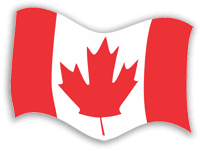|
The Bloc Québécois (BQ)
is a provincially-based
federal party dedicated to the achievement of an independent,
French-language nation of Quebec. Although there had been
individual separatists in the federal Parliament before, they
had no organized political party behind them. The party roots
lay in René Lévesque’s Parti Québécois which had come to power
in 1976 and governed well, even if the referendum on separation
in 1980 had been lost.
The direct political origins of the Bloc Québécois
can be traced to two events in 1984. The new leader of the
Progressive Conservative party, Brian Mulroney, himself a
Quebecker, decided to recruit former separatists to bolster the
ranks of his party in Quebec. It was a logical decision: the
Conservatives needed help. Where better to look than among
people who had been repeatedly defeated by the politically
dominant Liberals, and who hated the Liberal leader, Pierre
Trudeau? Mulroney
hoped that his recruits were more strongly opposed to Trudeau
than they were to acceptance of Canada; and his recruits for
their part hoped and expected that in return for their support
Mulroney would promote a looser Canada.
The other event of 1984 was the defeat of Jean Chrétien
by John Turner in a contest to be the successor of Trudeau as
leader of the Liberal party. It was the beginning of a feud
between Chrétien’s supporters and Turner’s, and it found a battlefield in Prime Minister Mulroney’s
promotion of a series of changes in the Canadian constitution,
called the Meech Lake Accord of 1987. The effect of the changes
was to give Quebec and the provinces generally more power over
federal institutions, and it placed Quebec, then headed by a
nationalistically-inclined Liberal, Robert Bourassa, in a
position to seek and quite possibly get more powers in future
constitutional negotiations. John Turner enthusiastically
accepted the Meech Lake package, as did all the provincial
premiers; but for Meech Lake to become law, it had to be
ratified by every provincial legislature within three years,
that is, by June 1990.
Thanks to the refusal of the Liberal government of Newfoundland,
delay by the Liberal government of New Brunswick, and resistance
by the Liberal opposition in Manitoba (among others), and a
campaign led by the retired Pierre Trudeau, Meech Lake collapsed
just as the federal Liberals were choosing a new leader. The
anti-Trudeau forces among Quebec Liberals backed Paul Martin
Jr., who in turn backed Meech Lake, while Trudeau’s fans
supported Jean Chrétien. When Chrétien won, some of the Quebec
delegates walked out, calling Chrétien a traitor. They included
two members of parliament, who quit the Liberal party. At the
same time the most prominent ex-separatist in Mulroney’s
cabinet, Lucien Bouchard, resigned from cabinet and proclaimed
that Canada was a failure; he then headed a group of eight
ex-Liberals and ex-Conservatives in the House of Commons who
organized themselves in 1991 as the Bloc Québécois, with the
tacit encouragement of Premier Bourassa of Quebec, who saw them
as increasing his bargaining power.
The charismatic Bouchard led his new party to 54 out of Quebec’s
75 seats in the 1993 federal election, and unexpectedly became
leader of the opposition in Parliament. Chrétien and the
Liberals formed the government, but the new prime minister faced
the fact that he was far less popular in Quebec than Bouchard.
So, ironically, was the new separatist premier of Quebec,
Jacques Parizeau, but it was Parizeau who decided that he had a
unique opportunity to take advantage of Chrétien’s unpopularity
and public opinion in Quebec, which was, he believed, trending
toward support for independence. Parizeau called a referendum
for October 1995, only to discover that support for separatism
was less certain than he had imagined. Humiliatingly, he had to
call in Bouchard, whose political talents were far superior to
his own. They almost won the referendum — but, having lost,
Parizeau had to go and was replaced as premier of Quebec by
Bouchard.
The Bloc Québécois was in a sense marooned in Ottawa. Its issue,
separatism, was indefinitely postponed. Eventually it found a
stable leader in a Montreal MP, Gilles Duceppe, but Duceppe lost
ground in two elections, 1997 and 2000, to Jean Chrétien. He did
better against Paul Martin, Jr., in 2004 and largely maintained
his party’s position against the more formidable Stephen Harper
in 2006 and 2008, assisted by Harper’s maladroit campaign style
in Quebec.
In some senses, the Bloc faces an existential dilemma. Its whole
reason for being is to promote Quebec separatism. It accepts and
even exploits Canada’s democratic constitution. Its MPs
participate in debates and votes in the House of Commons,
sometimes quite effectively and even constructively, and it
accepts the legality of federal laws. Its members pay federal
taxes and collect federal pensions and other subsidies. Some of
its MPs desert from time to time to join other parties. Whether
it likes it or not in principle, it is in practice part of the
federal system — including the federal party system. Ironically,
the BQ is a sign that Canada works.
Next Instalment: Sir John
A. Macdonald: Canada’s First Prime Minister
The Canadian Experience
is a 52-week history series designed to tell the story of our
country to all Canadians. Sponsored by Multimedia Nova
Corporation and Diversity Media Services/Lingua Ads partners,
the series features articles by our country’s foremost
historians on a wide range of topics. Past articles and author
bios are available at http://www.cdnexperience.ca.
The Canadian Experience
is copyright © 2010-2011 Multimedia Nova Corporation.
|
|


